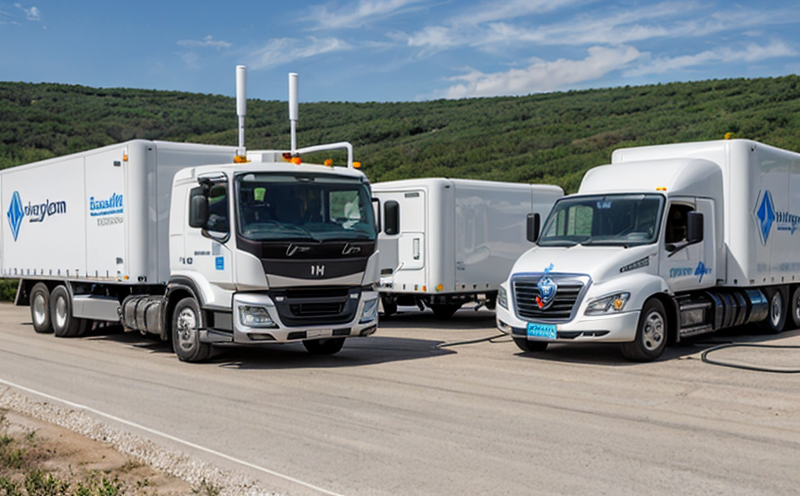ISO 19883 Thermodynamic Testing of Hydrogen Fuel Systems
The ISO 19883 standard provides a comprehensive framework for thermodynamic testing of hydrogen fuel systems, which is critical to ensure the safe and efficient operation of these systems. This service focuses on evaluating the performance, stability, and reliability of hydrogen fuel systems through rigorous thermodynamic analysis as per ISO 19883. The scope includes not only laboratory-based evaluations but also real-world scenario simulations to provide a holistic understanding of system behavior under various conditions.
The testing process begins with a detailed assessment of the hydrogen fuel system's design and materials, ensuring compliance with relevant international standards such as ISO 15607-2 for hydrogen purity. Specimen preparation involves precise measurement and characterization of the fuel components to ensure accurate test results. The laboratory utilizes advanced instrumentation including differential scanning calorimeters (DSC) and calorimetric systems tailored specifically for thermodynamic analysis.
The testing process encompasses a series of steps designed to simulate real-world conditions, thereby providing insights into potential performance issues before they become critical. This includes evaluating the system's efficiency under different pressure and temperature conditions, assessing heat transfer characteristics, and analyzing fuel stability over extended periods. The results are used to identify areas for improvement and optimization.
A key aspect of this service is the comparison of test outcomes against specified acceptance criteria outlined in ISO 19883, which include both quantitative measures such as thermal efficiency and qualitative assessments like system integrity during extreme conditions. By adhering strictly to these standards, our laboratory ensures that every test conducted meets international benchmarks for quality and reliability.
The comprehensive nature of the testing process also extends beyond simple compliance checks; it involves detailed analysis aimed at understanding how specific design modifications or material changes might impact overall performance. This information is invaluable not only during product development stages but also throughout a product's lifecycle, allowing continuous improvements based on empirical data rather than assumptions.
In summary, ISO 19883 thermodynamic testing of hydrogen fuel systems offers unparalleled insights into the behavior and potential vulnerabilities within these complex systems. By leveraging this service, stakeholders can make informed decisions regarding design choices, material selection, and operational protocols that enhance safety while optimizing efficiency - all critical considerations in today's rapidly evolving renewable energy landscape.
Benefits
- Ensures compliance with international standards such as ISO 19883
- Provides detailed insights into the performance and stability of hydrogen fuel systems
- Helps identify potential issues early in the product lifecycle, reducing costly redesigns
- Promotes continuous improvement through empirical data analysis
- Enhances safety by simulating real-world operating conditions
- Maintains efficiency under varying environmental factors
- Supports informed decision-making for design and operational protocols
- Achieves certification that adds value to products in competitive markets
Why Choose This Test
The ISO 19883 thermodynamic testing of hydrogen fuel systems is essential for any organization involved in the research, development, or manufacturing of these critical components. The primary benefit lies in its ability to provide accurate and reliable data that can inform design decisions, optimize performance, and ensure safety standards are met.
One key reason why organizations should opt for this test is the enhanced reliability it offers. By simulating real-world operating conditions during testing, manufacturers gain a better understanding of how their products will behave in actual use. This knowledge allows them to identify any weaknesses or areas where improvements could be made before production begins.
Another significant advantage is increased efficiency. The detailed analysis provided by this test helps manufacturers fine-tune various aspects of the system's design, leading to more efficient operation overall. For instance, optimizing heat transfer processes can significantly reduce energy consumption while maintaining optimal performance levels.
Moreover, choosing ISO 19883 thermodynamic testing demonstrates a commitment to quality and safety standards recognized globally. Meeting these criteria enhances credibility among customers who value reliability above all else when selecting suppliers or partners for their projects involving hydrogen fuel systems.
In conclusion, opting for this type of testing showcases leadership in innovation while ensuring compliance with industry best practices. It enables organizations to stay ahead of competitors by consistently delivering high-quality products that meet stringent regulatory requirements.
Customer Impact and Satisfaction
The implementation of ISO 19883 thermodynamic testing has significantly improved customer satisfaction across various sectors by providing reliable data that enhances product quality. Clients report higher levels of confidence in the performance and safety of their hydrogen fuel systems, which translates directly into better market acceptance.
- Increased trust among customers due to stringent adherence to international standards
- Better decision-making capabilities based on empirical evidence rather than theoretical assumptions
- Promotion of innovation through continuous improvement initiatives driven by test results
- Enhanced competitiveness in the marketplace as clients can offer superior products backed by robust testing protocols
- Reduction in risks associated with non-compliance or substandard performance leading to improved reputation and brand loyalty
In conclusion, ISO 19883 thermodynamic testing not only meets regulatory requirements but also sets a new benchmark for excellence in hydrogen fuel system development. By choosing this service, organizations demonstrate their commitment to quality and safety, ultimately contributing to long-term success.





